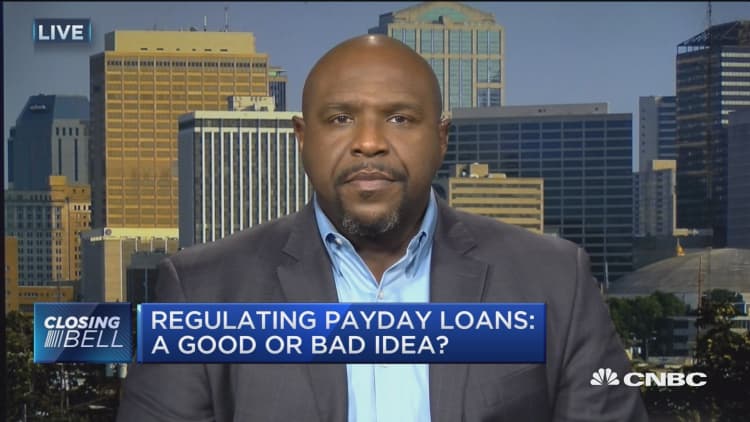Some consumers looking to free up cash for holiday spending this year are turning to a costly source: cash advances on lawsuits.
"This is a very busy time with holiday cash needs," said Chris Janish, chief executive officer of Legal-Bay LLC, which describes the cash it sends to plaintiffs as "non-recourse advances."
The volume of advances increases by 30 percent to 40 percent during the holiday season compared with typical months, said Ronald Sinai, founder of Nova Legal Funding. He said it is his company's busiest time of year.
"We get a lot of requests for $1,000 to $2,000 for presents for family and related expenses," said Sinai. "People want to give their kids that memorable Christmas."
More than half of consumers took on credit card debt to pay for holiday shopping last year, according to NerdWallet data, and 14 percent still haven't paid off their 2016 holiday debt. Consumers who used debt to fund holiday purchases last year took on an average of $1,003 in new debt, according to MagnifyMoney.
But tapping a pending legal claim for cash can be vastly more expensive than taking on credit card debt.
In a disclosure on its website pertaining to loans extended in South Carolina, Oasis Legal Finance LLC states that its maximum annual rate on personal loans is 98 percent. Legal-Bay's website says it charges a maximum rate of 26.9 percent on the first year of an advance.
In some cases, borrowers may also pay broker fees on advances. The website of Cash4Cases says it pays "referral fees" of up to 25 percent.
By comparison, the average annual variable credit card interest rate was recently 16.61 percent, according to Bankrate.

There are no publicly available industry-wide figures on the number of lenders or dollar amounts loaned to individual plaintiffs.
But figures on lending for commercial litigation show a booming industry. Some 36 percent of U.S. law firms reported this year that they have used litigation finance, compared with 7 percent in 2013, according to Burford Capital LLC. The company cautions that these numbers reflect use in commercial litigation matters, as opposed to use by individuals.
Individuals may turn to lawsuit loans after, say, an accident at a store or an injury at work. Some lenders work directly with injured individuals, while others are connected to borrowers through plaintiffs' attorneys.
Lenders review medical records
In determining whether to extend funds, lenders may review the plaintiff's medical records and any relevant police reports or court filings, if a claim has already been filed. In some cases, advances are approved within 24 hours.
Lenders are typically only paid back if a plaintiff wins in court or settles. That's why the structure is generally called a "non-recourse advance" instead of a loan.
That also means the advances are not, under current law in most states, considered to be loans, and so generally are not subject to laws that govern traditional lending products. Those laws include state usury laws that limit interest rates and the Truth in Lending Act, which requires lenders to provide certain disclosures on total loan cost, said Stuart Rossman, director of litigation at the National Consumer Law Center.
"It's an unregulated industry for the most part," said Rossman. "Without a Truth in Lending or comparable notice, it's very difficult for consumers to figure out how much they will ultimately pay."
It's an unregulated industry for the most part.Stuart RossmanNational Consumer Law Center
The Consumer Financial Protection Bureau indicated earlier this year that it might begin to take a more active role in policing the industry. In February, the agency filed a lawsuit against RD Legal Funding LLC, alleging that the lawsuit lender had scammed 9/11 responders by paying high-cost advances on settlement payouts and lying about the terms of the advances. That suit is pending.
CFPB may not play active role
But it's unlikely the CFPB will take an active role in regulating lawsuit lenders under acting director Mick Mulvaney, or under a future permanent director appointed by President Donald Trump, said Nora Freeman Engstrom, professor of law at Stanford Law School.
"At least in the near term, if there's going to be protection for consumers it will need to come from the states," she said.
Arkansas, Indiana and Tennessee have enacted laws in recent years to limit interest rates to maximums set by existing consumer lending laws or to require disclosures from lenders, said Page Faulk, senior vice president of legal reform initiatives for the U.S. Chamber Institute for Legal Reform, an affiliate of the U.S. Chamber of Commerce.
Rich Palma, president of Golden Pear Funding, said plaintiffs who take out advances receive better protection than borrowers may in other lending situations, because their own lawyers typically review, and often sign, advance agreements.
"In our business, the plaintiff is given an agreement that the plaintiff and the attorney both acknowledge," he said.
Because litigation moves slowly, the loans can have a beneficial role to play for injured plaintiffs, said Engstrom.
"What these companies are doing is addressing in some cases a genuine financial need, in that a victim is hurt, the victim can't go to work, the bills keep piling up and settlement is months if not years away," she said. "But the question is are these funding arrangements fair and made with adequate transparency."
More from Personal Finance
New rules aim to curb payday loan abuses
How the Fed rate hike will affect you


